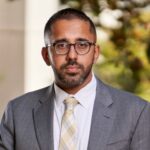This website uses cookies
We use cookies to ensure that we give you the best experience on our website. If you continue to use this site we will assume that you are happy with it.
Jump to:
Jaclyn Kelley-Widmer, Clinical Professor of Law, Director of the 1L Immigration Law and Advocacy Clinic
Ezra Brown, Clinical Teaching Fellow, Immigration Law & Advocacy Clinic (not pictured)

Jaclyn Kelley-Widmer
In fall 2025, a team of advanced students launched into the semester with preparation for an immigration court hearing scheduled in Buffalo. Students prepared the client for direct and cross exam, drafted opening and closing statements, and updated the record to account for new case law and emerging facts.
Additionally, the Immigration Law & Advocacy Clinic continues to work in immigration detention. Faculty and students traveled to the Buffalo Federal Detention Facility in Batavia in July 2025 and have another trip planned for October 2025. At the Buffalo facility, we worked in coalition with partner attorneys from the New York Civil Liberties Union, Prisoner’s Legal Services, and RFK Human Rights. We meet with detained people to provide them legal information and individualized legal advice for their cases. Students engage in trauma-informed interviewing, issue spotting, and analysis in a high-stakes environment.
Advanced students are also working with Ithaca-area community members and DACA holders, such as assisting a local youth with a Special Immigrant Juvenile Status application. Through Path2Papers, clinic students are serving DACA clients applying for employment-based visas and conducting legal research on DACA-specific issues.
The clinic works in public-facing advocacy by coordinating the inter-clinic Community Immigration Legal Information Project to deliver informational immigration presentations in the Ithaca community and beyond. Further, the clinic has recently produced public-facing written resources such as this explainer on how to submit a FOIA request for an immigration file and this advance parole guide with the Path2Papers project.
Biography for Ezra Brown
Ezra Brown is the teaching fellow with the 1L Immigration Law & Advocacy Clinic where he teaches students engaging in the direct representation of asylum seekers and dreamers. Prior to this role he worked on the Texas-Mexico border supervising Jones Day’s Border Project where he personally advised over 100 detained asylum seekers and trained volunteer attorneys to conduct over 1,000 consultations. Ezra also logged over 1,000 pro bono hours while working at Gibson Dunn and was recognized for this work by the State Bar of Texas’ W. Frank Newton Award and by the Houston Bar Association’s highest pro bono award—the Harris County Heart of Pro Bono.
Prior to receiving his J.D. from the University of Texas at Austin School of Law, Ezra worked for a federal judge, a U.S. Attorney’s office, as a summer associate at Gibson Dunn, as a student attorney in over a dozen clinical environments, and in a role teaching LL.M. students. Before law school, Ezra received his M.B.A. from Providence University in Taiwan while teaching English and earned a Bachelor of the Arts magna cum laude with honors from the University of Massachusetts Boston.
Ezra is barred in Texas and speaks Spanish.
Estelle McKee, Clinical Professor of Law (Lawyering)

Estelle McKee
In early September 2025, Adam Siegel, a May 2025 graduate, engaged in oral argument in the U.S. Court of Appeals for the Second Circuit on behalf of a clinic client from Turkey. Adam and his teammate, Lucy Oh, had written the appeal brief for the case in 2024. Adam did so well that he earned a compliment from Judge Livingston, presiding on the panel.
In the spring of 2025, clinic students wrote briefs addressing a complex asylum claim for a family from Afghanistan and withholding claims for a young man from Nigeria. Melissa Fergusson ’26 and Angelina Leach ’26 briefed an appeal before the Board of Immigration Appeals on behalf of a former gang member from El Salvador seeking Convention Against Torture protection based on the treatment of other former gang members by Salvadoran officials. The following summer, the board remanded, finding that the immigration court had failed to consider all evidence of future torture.
Gautam Hans, Clinical Professor of Law

Gautam Hans
The Civil Rights and Civil Liberties Clinic filed an amicus brief on behalf of Profs. Nelson Tebbe (Cornell) and Lawrence Sager (UT-Austin) in the Tenth Circuit in Darren Patterson Christian Academy v. Roy, supporting Colorado in a challenge to the state’s universal Pre-K program. This project followed from a similar project last year, in which the Tenth Circuit recently ruled for Colorado and adopted reasoning similar to what the clinic’s amicus had suggested in an amicus brief in that case on behalf of Profs. Tebbe and Sager.
The clinic’s co-counsel, Eric Lee, argued for our clients Isaias Sanchez Gonzalez and Celenia Yaqueline Gutierrez in a case regarding the denial of a visa, allegedly due to the content of unremarkable tattoos acquired within the United States. The clinic helped draft opening and reply briefs in this case in fall 2024 and spring 2025 and expects a decision in 2026.
Beth Lyon, Associate Dean for Experiential Education, Clinical Professor of Law, and Clinical Program Director
Tasha Gottschalk-Fielding, Immigrant Justice Corps Fellow

Beth Lyon

Tasha Gottschalk-Fielding
The Farmworker Legal Assistance Clinic continued its focus on representing child and youth farmworkers in deportation proceedings and in state courts, while working with clients impacted by the family separation policy, labor trafficking, and the H-2A temporary foreign worker program. Recently, we appeared in Cayuga and Oneida County courts, receiving orders placing four youth on a path to permanent immigration status. Farmworker clinic students have also appeared numerous times in Immigration Court over the summer and early fall representing clients in removal and bond hearings. Several students are working in a cross-clinic rapid-response team responding to the September 4 raid in Cato, New York, during which a clinic client with Deferred Action status and who was working legally, was taken from his workplace, moved from facility to facility where he faced horrific conditions and was denied access to legal counsel, and is now detained in Texas far from his entire family. The student team is currently collaborating with local counsel in New York and Texas to pursue all possible options for relief.
The clinic has also continued to expand its outreach in the Mohawk Valley Region, successfully raising a third year of funding for legal fellow Tasha Gottschalk-Fielding through partnerships with the Immigrant Justice Corps, the First Presbyterian and Baptist Churches in Cooperstown, New York, and the Community Foundation of Otsego County.
Mark Jackson, Director of the First Amendment Clinic and Adjunct Professor of Law
Heather Murray, Local Journalism Project Managing Attorney and Associate Director, First Amendment Clinic
Michael Grygiel, Adjunct Professor of Law
Michael Linhorst, Local Journalism Attorney (not pictured)
Daniela del Rosario Wertheimer, Stanton Fellow (not pictured)

Mark Jackson

Heather Murray

Michael Grygiel
The clinic in the past year alone has received grants totaling $3.3 million from the Knight Foundation, Revson Foundation, Stanton Foundation, Luce Foundation, the New York Community Trust, the Legal Clinic Fund for Local News at The Miami Foundation, and others, which together support its democracy sustaining work. Foundation support since the clinic’s inception in 2018 now exceeds $8 million and growing.
In recent months, the clinic has secured significant victories for clients, filed important lawsuits seeking access to public records, sought the reinstatement of a volunteer Quaker minister fired by a prison after publishing a book critiquing mass incarceration, and provided students, alumni, and faculty with opportunities to argue in state and federal courts and take depositions.
In May, a Vermont judge ruled that footage concerning the DUI arrest of the top prosecutor of Addison County must be released to clinic client VTDigger, a Vermont investigative news outlet. The team working on the case included Robert Plafker ’25 (who argued in court), Zachary Jacobson ’26, Grace Braider ’25, and Matthew Hornung ’24.
Gregory Jameson ’25 argued before the Vermont Superior Court in the spring with co-counsel the ACLU-VT in a case seeking greater transparency into the decision-making process behind the State of Vermont’s disbursement of opioid settlement funds.
Devin Brader-Araje ’26 and Stanton Fellow Daniela del Rosario Wertheimer argued before the Commonwealth Court of Pennsylvania in September on behalf of news outlets seeking access to Penn State University Board materials and to settlement records stemming from the death of a young woman while crossing train tracks, respectively.
Alexander Venditti ’ 25 argued before the Arizona Superior Court in October in a case seeking access on behalf of The Intercept to documents from the Arizona Attorney General’s Office and a nominal nonprofit entity about a mass financial surveillance program.
After a federal judge in the Northern District of New York sided in February with Catskills-based newspaper The Reporter in denying defendants’ effort to dismiss First Amendment retaliation claims, several students, Associate Director Heather Murray, and Adjunct Professor Michael Grygiel have taken and defended over a dozen depositions and have briefed and argued discovery motions.
In recent months, the clinic has also filed briefs defending a journalist against a subpoena brought by a disgruntled former constable, with Local Journalism Attorney Michael Linhorst arguing before the Third Department in October, and opposed efforts to withhold bodycam footage and other public records.
Elizabeth Brundige, Clinical Professor of Law

Elizabeth Brundige
In early September, a federal immigration raid in Cato, New York led to the unlawful deportation of a Gender Justice Clinic (GJC) client — a mother of three with valid work authorization and a pending asylum appeal. Clinic students and faculty together with colleagues in the Asylum and Convention Against Torture Appellate Clinic, who are representing our client in her appeal; Farmworker Legal Assistance Clinic; and Immigration Law and Advocacy Clinic, worked to locate her, coordinate with ICE officials, and support her family through an unimaginable situation. On November 13, our client was returned to the United States, but she remains in detention in Texas, far from her family. Read more about the family’s story in a recent New York Times article here and about the clinic’s work here.
GJC students and faculty also assisted the Farmworker Legal Assistance Clinic (FLAC) and other colleagues in preparing legal pleadings to prevent deportation and secure the release of a detained FLAC client. Read more here. In addition, the clinic has continued representing several gender justice advocates and their family members in their affirmative applications for asylum and other immigration matters.
In October, clinic students participated in the Peoples’ UPR, a civil society side event held next to the United Nations in New York City. The event drew attention to the refusal of the United States to participate in the UN Human Rights Council’s Universal Periodic Review, a process that involves the periodic peer review of all member states’ human rights records. The clinic supported the testimony of directly impacted partners and contributed to advocacy around issues of sexual violence, human trafficking, and LGBTQ+ rights violations.
In November, the clinic co-hosted with the Veterans Law Practicum and New York State Department of Veterans Services a day-long conference, With Duty and Dignity: Veterans Human Rights. Clinic members developed and spoke on a panel addressing military sexual trauma and international law.
The GJC also collaborated with the Movement Lawyering Clinic and National Council for Incarcerated & Formerly Incarcerated Women & Girls in preparing a gender-related compassionate release motion for an incarcerated client. In addition, the clinic supported LEGABIBO, the leading LGBTQ+ rights organization in Botswana, in developing a briefing paper on gender-based violence and continued work on the development of a handbook on anti-gender-based violence law for lawyers and judicial officers in Zambia.
Sandra Babcock, Clinical Professor of Law

Sandra Babcock
In January 2025, the U.S. Supreme Court issued a groundbreaking decision in the case of clinic client Brenda Andrew. The court concluded that the prosecutor’s tactics in Ms. Andrew’s case—which included extensive, irrelevant testimony and argument about her clothing, cleavage, underwear, and previous intimate relationships dating back decades—may have violated Ms. Andrew’s due process rights. The court remanded the case to the Tenth Circuit Court of Appeals where, in June 2025, International Human Rights Clinic alumna Nathalie Greenfield ’21 argued on behalf of Ms. Andrew. Ms. Greenfield had begun working on the case as a clinic student, and after graduation joined Ms. Andrew’s legal team. We are now waiting for a decision, and hope that Ms. Andrew will soon be off death row.
In spring 2025, the International Human Rights Clinic published several reports documenting human rights violations in Israel and Palestine. Working together with a coalition of non-governmental organizations and legal clinics from across the country, the clinic filed a complaint with the Committee on the Elimination of Racial Discrimination (CERD Committee) in February 2025, arguing that Canada and the United States had violated their obligations under the Convention on the Elimination of All Forms of Racial Discrimination by exporting weaponry to Israel that was used to destroy Gaza and kill thousands of Palestinian civilians. In response, the CERD Committee launched a formal inquiry into U.S. and Canadian arms exports, requesting detailed information from both governments about their arms transfers to Israel.
In May 2025, the clinic released a report entitled “Apartheid in Israel: An Analysis of Israel’s Laws and Policies and the Responsibilities of U.S. Academic and Other Institutions.” The report, a joint publication of the Cornell Law School International Human Rights Clinic, the University Network for Human Rights, and the Boston University Human Rights Clinic, is the first to analyze Israel’s laws and policies before and after October 7, 2023, under the framework of the Apartheid Convention. The report also examines the responsibilities of universities to protect the human rights to free speech and association of students and faculty who have criticized Israel’s human rights record.
Biography for Esha Sraboni
Esha Sraboni, Ph.D., has joined the Cornell Center on the Death Penalty Worldwide as a research fellow. Sraboni uses an intersectional lens and mixed methods to study gender, crime, and punishment in the United States and South Asia. She obtained her doctoral degree in sociology with a certificate in gender and sexuality studies from Brown University.
Angela Cornell, Clinical Professor of Law

Angela Cornell
This semester, the work of the Labor Law Clinic has become more challenging as the federal landscape shifts dramatically. The case load has also changed a bit and we have had a substantial drop in National Labor Relations Board cases. We have also had a substantial increase in final and binding arbitrations. We have five arbitrations involving questions of just cause. These cases all involve workers who were terminated. That is the largest number of arbitrations in one semester. Three of the cases involve immigrant workers. Arbitrations provide an excellent opportunity for students to acquire practical lawyering skills in evidentiary hearings. Students do the opening argument, direct and cross examinations, and in some cases a closing argument. They deal with evidentiary issues and objections. They also research and write the pre- or post-arbitration briefs. For most, it is the first opportunity to deal with opposing counsel.
We are celebrating an arbitration victory from last semester. Clinic students represented a young worker who had been fired when he broke his leg. He needed surgery and advised his employer but was terminated after two weeks while he was recovering on short-term disability. The arbitrator ruled in favor of the client, finding that the worker’s termination violated just cause and reinstated him.
Other cases this semester include the sexual harassment of a young worker that has been working its way through the administrative process and is scheduled for a hearing in the spring. We had a settlement conference in that case recently but could not resolve the matter. We also have ongoing collective bargaining work, and a federal sector legal issue. Another inquiry we are working on involves an analysis of whether the workers are independent contractors or employees and the implications of that status. Students have done a fine job of advancing the interests of workers despite the challenging times.
Susan Morgenstern, Adjunct Professor of Law
Marquise Riley, Adjunct Professor of Law

Susan Morganstern

Marquise Riley
The Low-Income Taxpayer Law and Accounting Practicum (LITLAP) was founded in spring 2018 to teach teams of law and accounting students to prepare complex tax returns for farmworkers and exonerees. After receiving its first IRS grant under the federally funded Low Income Taxpayer Clinic program in 2025, the practicum’s mission shifted to representing low-income taxpayers in disputes before the IRS and in court.
Beginning with the spring 2025 semester, under the new grant, LITLAP has represented a range of low-income taxpayers before the IRS and the Tax Court. We successfully represented a taxpayer seeking innocent spouse relief after her late husband’s undisclosed tax debt left her owing thousands of dollars, resulting in the IRS conceding her non-liability and refunding her prior payments. We also represented a married couple in a Tax Court case where the IRS had incorrectly treated a cash award as taxable income; the IRS ultimately conceded the entire $25,000 liability.
Currently, we are representing just under a dozen inmates in their refund claims related to the Economic Impact Payments from tax years 2020 and 2021.We are pursuing Freedom of Information Act requests with the Department of Treasury’s Bureau of the Fiscal Service and with the IRS. These clients are especially vulnerable to identity theft and refund theft. We have filed refund claims where necessary and are also pursuing other avenues for relief, including determining whether we can expand the definition of informal refund claim to support otherwise time-barred refund claims. As part of our refund theft research, we have concluded that refunds were loaded onto debit cards that were not authorized or obtained by our taxpayers, and thus we must determine whether and how to pursue those claims against that debit card issuer.
Beyond direct client work, we partnered with the ABA Tax Section in submitting substantive comments in response to the Executive Order requiring that tax refunds be issued only electronically. Our comments focused on specific groups of unbanked taxpayers, and also discussed the limitations, expense, and pitfalls of debit cards for those who are unbanked. The comments were published in Tax Notes Today, a leading daily tax periodical.
We are also drafting an amicus brief addressing whether taxpayers on home detention may qualify for the earned income tax credit because income earned “while an inmate at a penal institution” is not considered earned income for the EITC. We are finalizing comments to revise the IRS’s identity theft affidavit to make it clearer, more inclusive, and to enable it to serve as a refund claim. Additionally, we are representing a client referred by the Gender Justice Clinic, whose potential tax liability could affect her immigration status. The particular issue is one of first impression at the intersection of tax and immigration law.
Faculty:
Marquise Riley, CPA, is an adjunct professor in the Low Income Taxpayer Clinic. He is the Owner of Riley Financial Accounting Advisory, providing services in tax compliance, business advisory, bookkeeping, and financial reporting to individuals and businesses. Previously, he served as an assurance senior at Ernst & Young, where he managed audit teams, oversaw implementation of accounting standards, and guided staff development. In academia, Professor Riley served as lecturer in accounting at Cornell University’s Dyson School, where he was awarded for Teaching Excellence in Undergraduate Program. His research and publications address tax policy, IRS procedures, and taxpayer rights, with work appearing in the Journal of Accountancy, TaxStringer, and the BRC Academy Journal of Business. Riley holds a CPA license in Virginia and earned his Master of Professional Studies in Management—Accounting from Cornell University.
Susan Morgenstern is an adjunct professor in the Low Income Taxpayer Clinic. She is formerly the senior attorney at the Center for Taxpayer Rights where she worked to ensure the protection of taxpayer rights. Simultaneously, she served as adjunct professor at the Beasley School of Law at Temple University where she taught low-income taxpayer policy issues. Prior to these positions, Professor Morgenstern served in several positions in the IRS Taxpayer Advocate Service, including acting supervisory attorney advisor for the National Taxpayer Advocate’s Attorney Advisory Group, Local Taxpayer Advocate in Cleveland, Ohio, and technical advisor to TAS’s case advocacy and in the LITC Program Office. Previously, Morgenstern was senior attorney with the Legal Aid Society of Cleveland where she founded and directed the low-income taxpayer practice at Legal Aid, the first in Ohio and one of the first nationwide integrated into a legal services practice. She was recently elected to the American Bar Association Tax Section’s Executive Committee as vice chair, pro bono and outreach, and is a fellow of the American College of Tax Counsel. She is a past chairperson of the American Bar Association Section on Taxation’s Pro Bono and the 2021 recipient of the American Bar Association Tax Section’s Janet Spragens Pro Bono Award.
William Niebel, Managing Attorney, Tenants Advocacy Program, and Adjunct Professor of Law
Kathryn Krause Wozer, Tenants Advocacy Staff Attorney and Adjunct Professor of Law (not pictured)

William Niebel
Now in its sixth year, the Tenants Advocacy Practicum is broadening its reach as a cornerstone of housing justice in upstate New York. With more than 2,000 intakes since its founding, the overarching Tenants Advocacy Program has expanded both its caseload and its team to meet the needs of tenants facing eviction and other housing injustice.
This summer, the Tenants Advocacy Program welcomed seven J.D. students as full-time interns to focus on the Monroe County Tenant Defense Project. Acting under a student practice order, they represented thirty-two tenants facing eviction in Rochester Housing Court. While some matters remain ongoing, the interns secured numerous favorable settlements, saving clients a combined $37,645 in rental arrears. Their commitment both inside and outside the courtroom reflects the Program’s mission of expanding access to justice for tenants across upstate New York.
Innovation also advanced this summer with the beta launch of “Teny 2.0,” the Program’s AI tenants’ rights chatbot developed in collaboration with legal automation startup Josef. Building on the original Teny chatbot, this platform now provides tenants with quick, comprehensive housing law information while under close attorney moderation.
The 2025–2026 academic year is equally dynamic. So far this fall, sixteen practicum student-attorneys are advising and representing thirty-six tenants. Case outcomes this year have included negotiated rent abatements, successful appeals delaying or overturning evictions, and judgments securing essential repairs and financial relief. To support this growing caseload, the Tenants Advoacy Program is currently recruiting law student volunteers, spring externs, and pro bono scholars to join the team. In the meantime, having received unprecedented levels of interest from over sixty undergraduate students, the Program is onboarding a record-breaking cohort of twenty undergraduate volunteers to assist with hotline intake, court monitoring, data analysis, tech, and communications.
Professor Niebel’s highly anticipated treatise, the New York Guide to Residential Landlord-Tenant Law, will be published by LexisNexis later this semester. Professor Wozer is busy with casework and will be teaching the practicum again in the spring. The Tenants Advocacy Program is so grateful to be supported by Coordinator Francheska Reed ’24, Tenants Advocacy Fellow Driston Galvao ‘23, and a growing student volunteer team.
Biography for Driston Galvao ’23, Tenants Advocacy Fellow
Driston Galvao is the legal fellow for the Tenants Advocacy Program, where he serves as a dedicated tenants’ rights advocate who is passionate about ensuring safe and fair housing for all. Driston earned his B.A. from Tufts University and his J.D. from Cornell Law School, where he was a participant in the Tenants Advocacy Practicum. This experience solidified his passion for housing justice and his commitment to advancing access to justice for all. In his current role, Driston assists tenants with a wide array of landlord-tenant law needs, from habitability claims and lease disputes to illegal lockouts and evictions. In addition to this direct client advocacy, Driston leads the program’s tech team. He is currently spearheading the development of an innovative AI tool designed to democratize access to legal information, providing helpful, immediate answers to tenants with questions about their rights.
Ian Kysel, Associate Clinical Professor of Law

Ian Kysel
Students in the Transnational Disputes Clinic continue to pursue an active docket of litigation spanning refugee and migrant rights strategic litigation cases and investor state arbitration. Last semester, students Jingcheng Shi ’26, Tara Scown ’26, and Sarah Whittenburg ’26 filed a non-disputing party submission before a tribunal at the International Centre for the Settlement of Investment Disputes in a case weighing the implications of Germany’s coal phase out for obligations under the Energy Charter Treaty on behalf of Cornell Law professors Leehi Yona and Allison Chatrchyan and several other legal experts and climate scientists. Several other students were involved in litigation brought against Panama, Costa Rica, and El Salvador in international tribunals in cases arising from the expulsion of migrants from the United States, all in partnership with the Global Strategic Litigation Council for Refugee Rights, incubated at the Cornell Law School Migration & Human Rights Program. New York Times coverage of the cases is here, here, and here.
James Hardwick, Veterans Law Staff Attorney and Adjunct Professor of Law

James Hardwick
The Veterans Law Practicum continues to expand its impact through advocacy for veterans across New York and nationwide, with recent case successes highlighting the critical importance of trauma-informed legal representation.
Recently, Veterans Law Practicum students secured two significant victories for survivors of military sexual trauma whose discharge statuses and benefits eligibility had been unjustly denied for years.
In the first case, students Kayla Espinoza ’26 and Tyler Dixon ’25 represented a female Army veteran who, at 18 years old, was groomed and assaulted by a superior officer during basic training. In an attempt to escape her abuser, she went AWOL and was separated under Other Than Honorable conditions—a decision that stripped her of Department of Veterans Affairs benefits for nearly two decades. The students conducted extensive factual and legal research, helped the veteran prepare a detailed personal statement, and gathered records demonstrating that her conduct stemmed from untreated post-traumatic stress disorder (PTSD) related to her assault. Their advocacy led the VA to grant her full access to healthcare and disability compensation for service-connected PTSD.
In the second case, student Patrick George ’24 successfully advocated before the Air Force Discharge Review Board on behalf of a veteran whose service was similarly marred by sexual assault and its aftermath. The veteran’s experience of military sexual trauma led to lifelong problems with mental health and substance abuse despite being an exemplary airman prior to the assault. The board agreed that his less-than-honorable discharge was unjust and upgraded it to Honorable, restoring his access to long-denied benefits.
Practicum students also secured federal court remands in two complex VA disability appeals. Eric Gregory ’25, Nicholas Pantazopolous ’25, Riccardo Silvestri LLM ’25, and Gabby Delp ’26, reviewed thousands of pages of military and medical records, drafted legal briefs, and successfully argued for remand on VA service-connected disability claims.
The Veterans Law Practicum will host a statewide conference on November 19 exploring the intersection of veterans’ issues and human rights. Cosponsored by the New York State Department of Veterans’ Services and the Gender Justice Clinic, the event will bring together speakers from across New York to discuss topics including military sexual trauma, immigration, and the legal challenges faced by low-income and justice-involved veterans. This conference underscores the Practicum’s commitment to addressing veterans issues through a human rights framework.